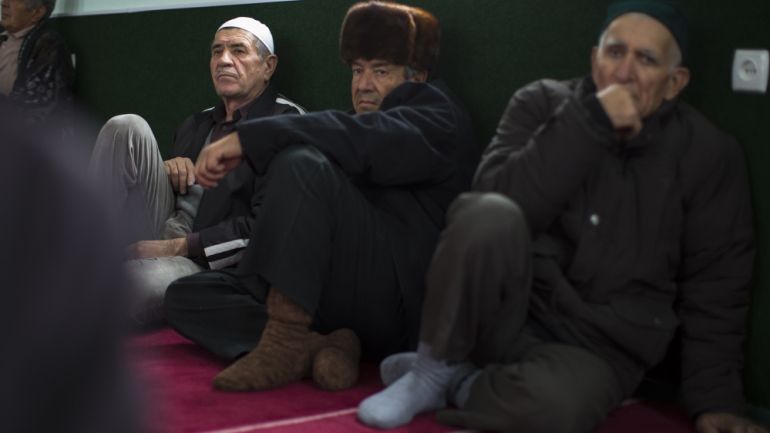Russia’s crackdown on Crimean Tatars foreshadows wider repression | Russia-Ukraine war News
At 6am on Thursday, a group of seven Russian soldiers raided Leila Ibragimova’s home in Melitopol in southeastern Ukraine.
Ibragimova, an ethnic Crimean Tatar, is a well-known figure in the city, which has fallen under the control of the Russian army following Russia’s invasion of Ukraine. A deputy of Zaporizhzhia Regional Council and director of the Melitopol Municipal Museum, she has been a strong advocate for her constituency, including the local population of about 12,000 Crimean Tatars – a Muslim group indigenous to nearby Crimea, a territory Russia annexed in 2014.
The soldiers reportedly put a bag over Ibragimova’s head and forced her into a car, driving around for a while before they took her to an unspecified location for questioning.
They asked her about Azad, a local Crimean Tatar organisation, as well as the names and addresses of activists and opinion leaders in her area. Ibragimova refused to give the men any information and told them their actions were illegal. This is still Ukraine, she said, and Russian law does not apply.
Ibragimova was released later that day and the Russian occupying forces decided not to press any charges against her.
However, analysts say the arrest may give insights into Russia’s long-term plans when it comes to the territories it took control of in the past two weeks, and tactics it may use to achieve them.

“The goal of the detention was to threaten Ibragimova, get the most information about her contacts, and identify people and organisations that Russian forces should target next. These are well-known methods of Russian security services. They have done the same in Crimea since 2014,” Nedim Useinow, a political scientist at the faculty of European Islam, University of Warsaw, told Al Jazeera.
Useinow said Russia’s plan appears to seize territory enabling it to permanently cut off Ukraine’s access to the sea and connect breakaway regions of Donetsk and Luhansk with the Russian mainland and Crimea.
“They also want to secure access to water from Dnieper River because they still haven’t solved the problem of water scarcity in Crimea,” he said.
“They have also begun to bring some Crimean Tatar collaborators over to organise agitation in the Kherson region.”
Persecution of activists
A closer look at Russia’s policies in the annexed Crimea towards Tatars may provide an indication of what can happen with activists, officials and community leaders in other southern Ukrainian territories that have recently fallen under Russian control, analysts say.
“The situation of Crimean Tatars in Crimea has been hard since the beginning of the occupation. Russia has been persecuting all activists who are against the occupation and organised purges,” Lenur Kerymov from the Polish Helsinki Foundation for Human Rights told Al Jazeera.
“Until now, around 20 people have been disappeared in Crimea. They were abducted by the security services and they are most likely dead. It has hugely influenced the morale of the people. Russia’s policy towards Crimean Tatars is that of terror.”
Analysts say that while repression of Crimean Tatars is partly due to religion, it is also because many in the community have protested against the Russian annexation and criticised it in the media.
Over the past eight years of Russian presence in Crimea, activists’ homes have been searched, almost all independent Crimean Tatar media outlets were closed and local journalists were either forced to leave or change their focus from politics to entertainment. There is full censorship of local media.
The politics of Russification have also been in full force. While on paper Crimea has three official languages, namely Russian, Crimean Tatar and Ukrainian, local activists and experts say that schools are discouraged from teaching in Crimean Tatar and Ukrainian.
Kerymov says the policies aim to remove all the traces of Tatar identity and culture and thwart any civil movements.
“There are over 100 Crimean Tatars that we consider prisoners of conscience in Russian prisons with long prison sentences. The majority of these people are religious Muslims,” Kerymov said.
“Russians claim that they are members of Hizb-ut-Tahrir [an Islamic political party], which is banned in Russia. In Ukraine the party is legal and there is no evidence that any of their members in Ukraine or Crimea were connected to any criminal activities, terrorism or extremism. These are simply people who believe differently.”
In some cases, people were imprisoned for merely possessing a Quran, Kerymov says.
Kerymov’s predictions on what might happen next in the newly occupied territories of Ukraine are far from optimistic.
“All activists and people who could lead mass protests will be threatened, there will be imprisonments. I hope that there will be no killings but we have to prepare for that, too,” he said.
“These are typical methods Russia uses to punish and threaten local populations.”

Pingback: xshell
Pingback: Aviator slot